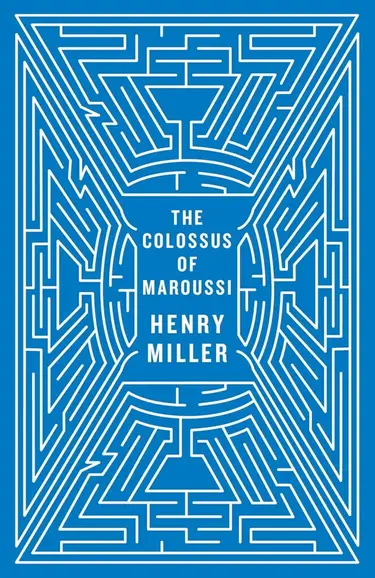The Colossus of Maroussi

At its core, The Colossus of Maroussi is a personal exploration of Miller's deep appreciation for Greece and its people. The narrative is a blend of vivid descriptions, philosophical reflections, and poetic musings. Miller immerses himself in the Greek way of life and the natural beauty of the country.
Now and then a great blue area of sea rose out of the fog, not at the level of the earth but in some middle realm between heaven and earth, as though after a typhoon. The houses too, when their solidity burst through the mirage, seemed to be suspended in space. The whole atmosphere was ridden with a shuddering Biblical splendor punctuated with the tinkling bells of the ponies, the reverberations of the poison song, the faint boom of the surf far below and an undefinable mountain murmuring which was probably nothing more than the hammering of the temples in the high and sultry haze of an Ionian morning.
henry miller, colossus of maroussi
The book takes its title from the larger-than-life figure of George Katsimbalis. George is an eccentric Greek poet and philosopher whom Miller befriends during his travels. Katsimbalis becomes a central figure in the memoir, embodying the spirit of Greece and its ancient legacy.
Throughout the Colossus of Maroussi, Miller delves into his thoughts on art, literature, spirituality, and the human condition. He reflects on the connection between creativity and the natural world. Often, he draws inspiration from the Greek landscape and the myths and history that permeate the country.
The overall tone of the memoir is morose. That tone is likely due to the impending destructiveness of a new war.
For as I stood there daydreaming I had the impression that everything was at a standstill, that I was not a man living in the twentieth century but a visitor from no century seeing what he had seen before and would see again and again, and the thought that that might be possible was utterly depressing.
—Henry Miller, Colossus of Maroussi
The Colossus of Maroussi is known for its lyrical and poetic prose. Often, it is quite visceral:
[a]s long as human beings can sit and watch with hands folded while their fellow men are tortured and butchered so long will civilization be a hollow mockery, a wordy phantom suspended like a mirage above a swelling sea of murdered carcasses.
—Henry Miller, Colossus of Maroussi
While the memoir does not follow a linear narrative structure, it provides a captivating and immersive experience of Greece. Miller's love for the country shines through the pages. The Colossus of Maroussi is a celebration of Greece's unique spirit and its enduring influence on art and literature.